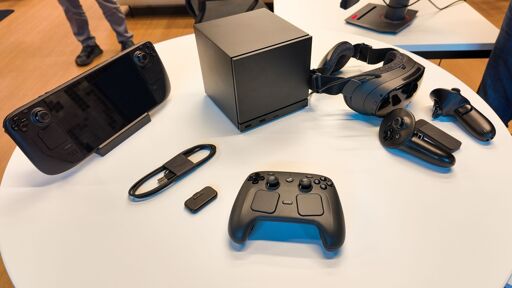Being a tech journalist, hell, even just being a PC gamer in 2025, means that you have to accept that every time you hear from a hardware company about some new product they’re releasing, or feature they’re adding, it will almost exclusively be something to do with AI. Whether directly, indirectly, tangentially, or just plain pointlessly.
So, thank you Valve, for offering up three new pieces of Steam hardware this week that made not one mention of the initialism de jour: AI.
The closest we got was when its engineers noted the Steam Machine was being targeted for 4K60 gaming, but only via the use of upscaling. Even then, it’s an AMD-based system, and FSR has only just got itself updated to machine learning algorithms with the FSR 4 update. That, however, is still effectively tied to the Radeon RX 9000-series of graphics cards, and most definitely not available to the Navi 33 GPU at the heart of the Steam Machine’s discrete GPU.
Valve’s hot hardware

(Image credit: Future)
Steam Frame: Valve’s new wireless VR headsetSteam Machine: Compact living room gaming boxSteam Controller: A controller to replace your mouse
It’s not even like it’s just been this year, either. Ever since ChatGPT grabbed people’s collective basal ganglia at the tail end of 2022, the swell of AI-ness being added to everything possible (and often irrelevant) in tech has exponentially increased. Every event, every launch, every show has been tailored around just what level of AI-ification the company in question has been able to jam (or pretend it has) into whatever it is they’re showing off.
CES and Computex ever since have been ‘brought to you…’ or ‘powered by…’ AI. And every booth without end has had to plaster those two letters all over them. Graphics cards and CPUs are now being sold to us on the benefits they can bring to all the AI things we do every day (can you name one outside of upscaling and frame gen?), and Windows has decided that it’s now an agentic operating system.
I’m not saying I don’t ever use AI; I love me some DLSS and Frame Generation, Photoshop has become more effective than ever for my job, and Gemini’s been making me HTML table code on the regular. I just don’t want to have it jammed down my throat at every turn.
So it’s immensely refreshing that the Steam Controller has no AI button to call up some little cutesy G-Man within SteamOS to ask ‘Would you like help with that?’ The Steam Machine, with its 16 GB RAM and 8 GB VRAM quotient, isn’t going to be housing the latest local LLMs out of the box, and the Steam Frame isn’t filling your eyeballs with AI slop as a default setting.
Image 1 of 3
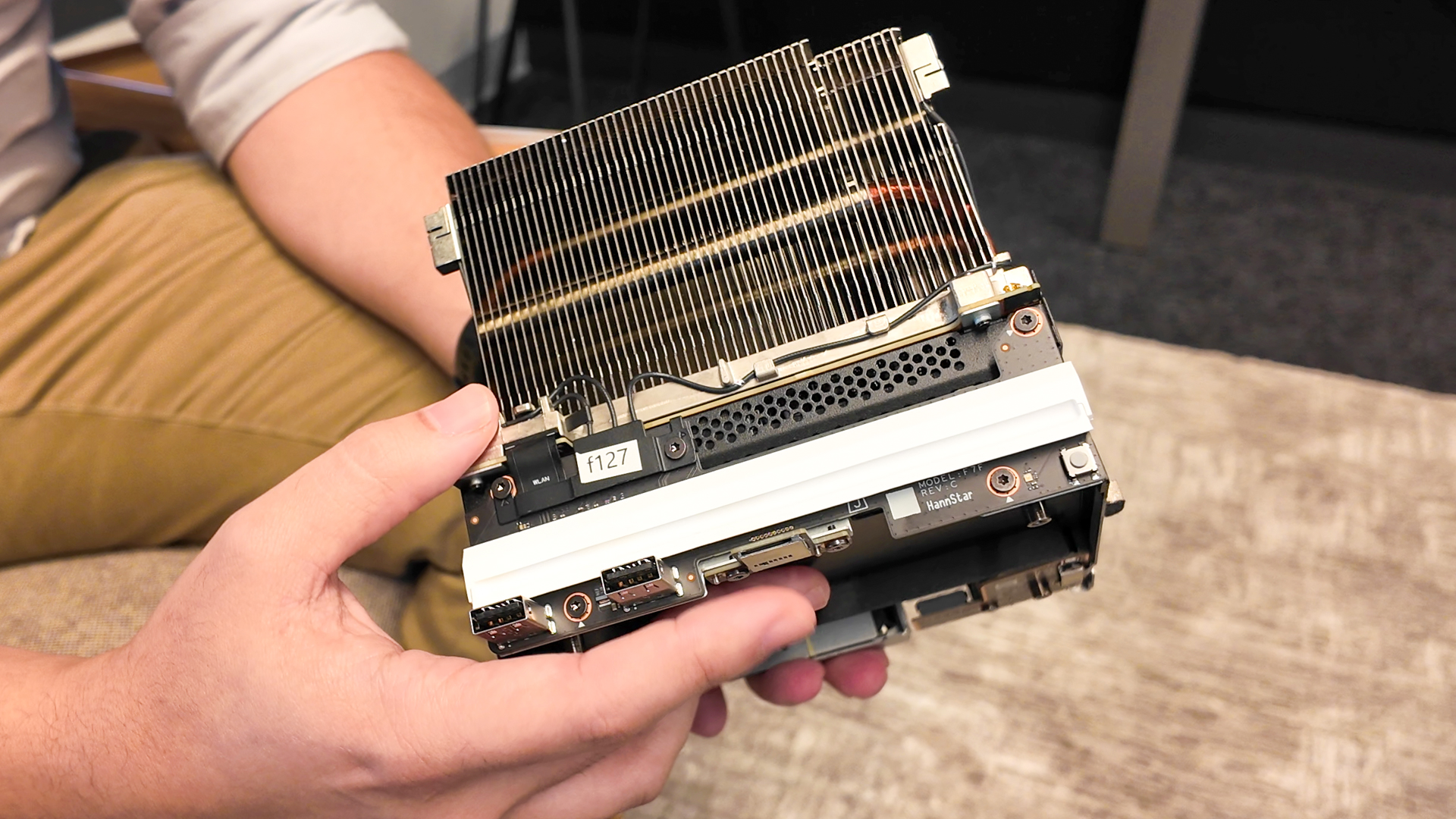
(Image credit: Future)
Image 2 of 3
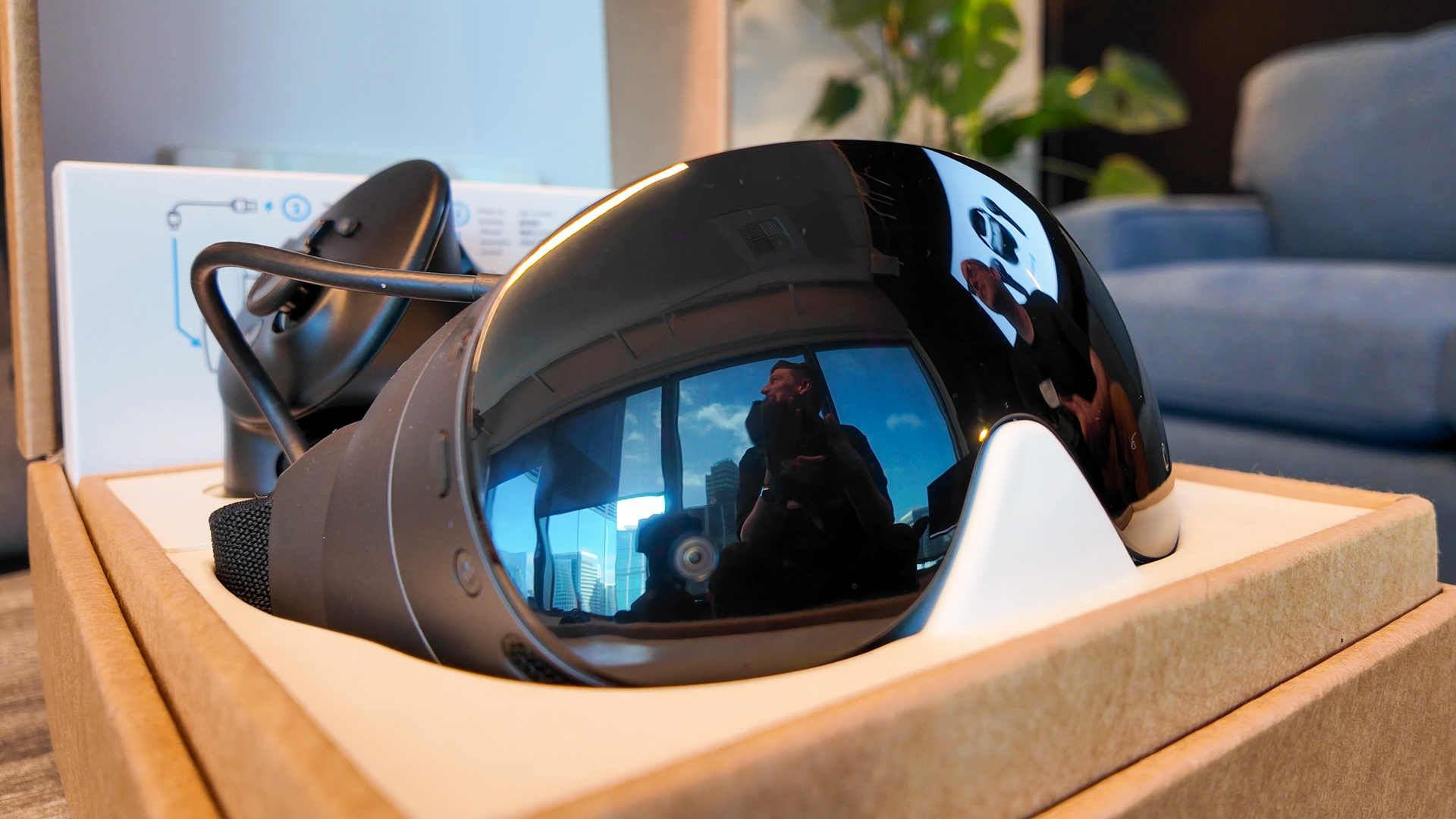
(Image credit: Future)
Image 3 of 3
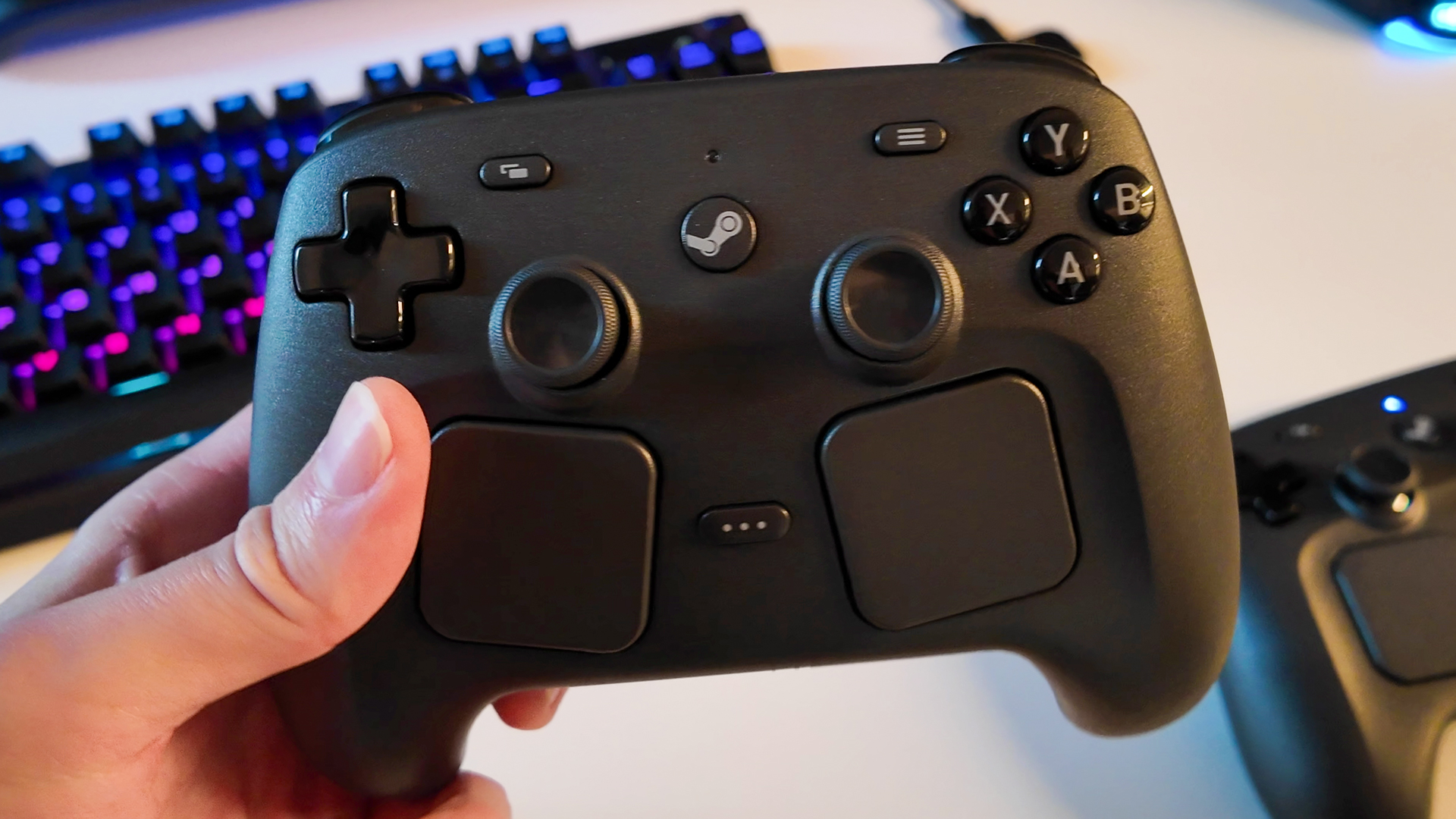
(Image credit: Future)
If Microsoft really is going to be pursuing the current trajectory to make Windows 11 an AI-forward OS, then I’m glad we’ve got Valve making PC gaming on Linux genuinely viable.
I’m not saying I want to jump ship to SteamOS right now—I actually had a better time playing with Bazzite in desktop mode on the Framework Desktop than trying to jam SteamOS on handhelds that really should be compatible by now—but the work it’s put in with Proton (and now with FEX) is breaking PC gaming away from Windows more effectively than ever before.
In fairness, Microsoft is beholden to shareholders, and if you’re in tech right now, you’re going to be under immense pressure to deliver a slice of the billions being spent on AI back to your investors or face stern questions as to why not. Doesn’t mean we have to like it as an end-user, though.
So, if you want an operating system and a PC just for gaming, and maybe for work, AND DEFINITELY NOT FOR ANY AI SHENANIGANS, then a simple Linux distro is going to suit you and I a whole lot better.
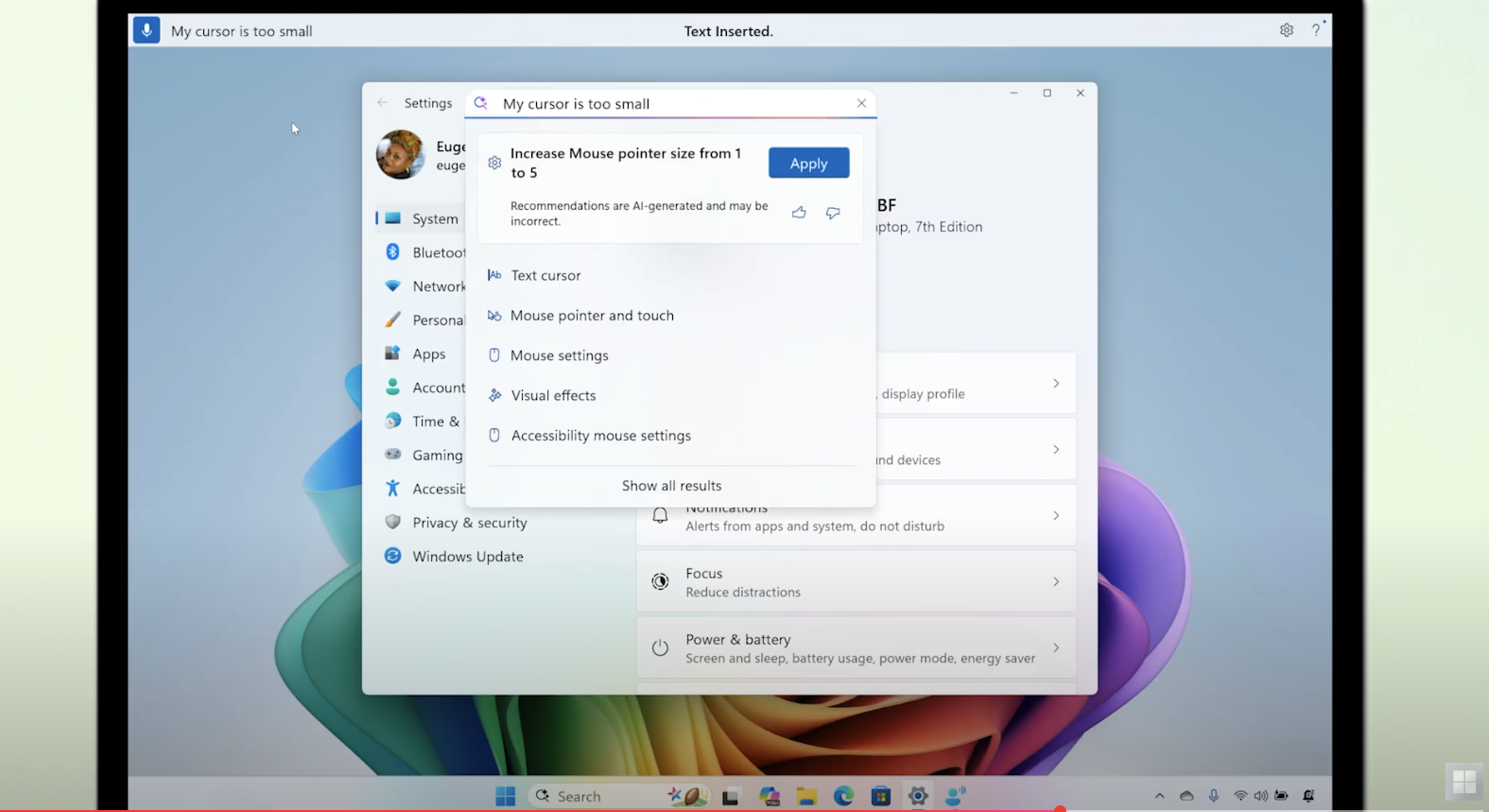
(Image credit: Microsoft)
The somewhat inevitable caveat to all this is you are still going to be locked out of some of the biggest games with Linux. Fortnite, CoD, and Battlefield 6 aren’t going to work on Linux—maybe ever—because Epic has no desire to benefit Steam by fixing up its anticheat software, and Activision and EA need to make its own one as robust as possible.
No one likes cheats, and no developer or publisher wants to see their online game get murdered by cheaters driving legit gamers out, so kernel-level anti-cheat software is going to be here until someone finds a better way that will include Linux distros.
But, screw it, I’m notoriously anti-social, so multiplayer gaming is no sell for me whatsoever. Not having to hear another company exec. extol the virtues of whatever AI MacGuffin they’ve jammed into their new thing, however, is a very big sell.
&
Best gaming rigs 2025
All our current recommendations
Pick a category Best overallCore ComponentsChairs & DesksSystems & LaptopsScreensPeripheralsCases, Cooling & Storage Choose a list Best gaming laptop 2025Best gaming PC 2025Best gaming rigs 2025Best handheld PC 2025Best mini PC 2025  BEST GAMING LAPTOP 1. Razer Blade 16 (2025) Check Price
BEST GAMING LAPTOP 1. Razer Blade 16 (2025) Check Price  BEST GAMING PC 2. HP Omen 35L Check Price
BEST GAMING PC 2. HP Omen 35L Check Price  BEST HANDHELD GAMING PC 3. Lenovo Legion Go S SteamOS Check Price
BEST HANDHELD GAMING PC 3. Lenovo Legion Go S SteamOS Check Price  BEST VR HEADSET 4. Meta Quest 3 Check Price Read the full guide: Best gaming rigs 2025POWERED BY
BEST VR HEADSET 4. Meta Quest 3 Check Price Read the full guide: Best gaming rigs 2025POWERED BY &&&&&&&&&&&&&&&&&&&&&&&&&&&&&&&&&&&&&&&&&&&&&&&&&&&&&&&&&&&&&&&&&&&&&&&&&&&&&&&&&&&&&&&&&&&&&&&&&&&&&&&&&&&&&&&&&&&&&&&&&&&&&&&&&&&&&&&&&&&&&&&&&&&&&&&&&&&&&&&&&&&&&&&&&&&&&&&&&&&&&&&&&&&&&&&&&&&&&&&&&&&&&&&&&&&&&&&&&&&&&&&&&&&&&&&
&&&&&&&&&&&&&&&&&&&&&&&&&&&&&&&&&&&&&&&&&&&&&&&&&&&&&&&&&&&&&&&&&&&&&&&&&&&&&&&&&&&&&&&&&&&&&&&&&&&&&&&&&&&&&&&&&&&&&&&&&&&&&&&&&&&&&&&&&&&&&&&&&&&&&&&&&&&&&&&&&&&&&&&&&&&&&&&&&&&&&&&&&&&&&&&&&&&&&&&&&&&&&&&&&&&&&&&&&&&&&&&&&&&&&&&
From PCGamer latest via this RSS feed


